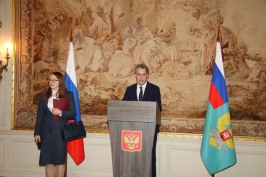Your Excellencies, ladies and gentlemen,
I am glad to welcome you to our mission on the occasion of the Russian Diplomacy Day.
One of the main goals of diplomacy is to find collective responses to common challenges. We have enough of these: pandemic recovery, climate change and persistent terrorist threats. And, most importantly, the profound upheavals that the international relations system is undergoing today.
A few days ago, on 2 February, the world marked the 80th anniversary since the Battle of Stalingrad ended. It turned the tide of the Second World War. Essentially, the outcome of the battle opened up new opportunities for the diplomatic efforts of the anti-Hitler coalition countries, which resulted in the establishment of the United Nations.
After the end of the Cold War, however, the West set out to build a unipolar world. Its unwillingness to respect the views and interests of other states and to listen to its partners, and its ambition to gain a monopoly on decision-making in the international arena, have provoked crisis phenomena, including the conflict in Ukraine. We responded by launching a special military operation.
Today's events are indeed a watershed. We are witnessing a tectonic shift in the international relations system, an early stage in the emergence of a multipolar world. Therefore, we are to build a new security architecture on an equal and mutually beneficial basis.
I believe you will share my view: the EU is not an easy partner for any of us.
I am convinced we would all like to see the EU as a strong, predictable and, above all, independent player.
But, instead of being realistic about current developments, Brussels divides the world into “the jungle” and “the garden”. It applies unilateral restrictive measures, protectionist actions, pressure and blackmail on those countries that are not willing to follow policies inconsistent with their national interests. All this destabilises the situation in the world even further.
Yet, I am sure that all of us gathered here are united not only by our accreditation in Brussels, but also by our shared will to engage in mutually respectful dialogue and to seek mutually acceptable solutions.
Thank you for your attention.























